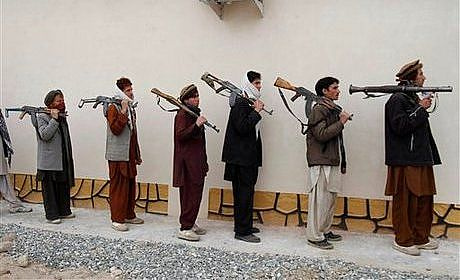Peace Cannot Be Bought

During the past few days, representatives of the government of Afghanistan, Taliban rebels and political groups and parties participated in a conference to discuss the future of Afghanistan following the complete withdrawal of NATO military personnel from this country in 2014. With the help of the French government, France’s Foundation for Strategic Research had previously held similar conferences in Paris in November 2011 and June 2012. This was the first time that the representatives of the Taliban, members of the Afghan High Peace Council and influential personalities from the north coalition which have, for years, fought against the Taliban all gathered in a conference. But the government of Hamed Karzai, the Afghan President, has not yet been able to hold face-to-face negotiations with the Taliban.
In this conference, Ghairat Baheer, Gulbuddin Hekmatyar’s deputy and son-in-law, was the head of the Hizbi Islami delegation. Mohammad Yunis Qanuni was the representative of the National Coalition, and Ahmad Zia Massoud, Mohammad Mohaghegh and Faizullah Zaki represented the National Front. Hanif Atmar, one of the members of the Truth and Justice Party, Farkhunda Zahra Naderi and Niloufar Ebrahimi, female representatives in Afghanistan’s House of Representatives, were among the other participants in this conference. The Taliban's representatives were Mullah Shahabuddin Delawar and Muhammad Naeem Wardak. Masoom Stanekzai, the secretary of the High Peace Council, and Hajji Din Mohammad, advisor to the Afghan president, were also present in this conference.
But the question that comes to mind is whether this conference, or similar conferences, has been able to lead to peace, stability, welfare, and progress for the people of Afghanistan? A look at a decade full of such conferences shows that they are more to the benefit of European countries and the US than Afghanistan. We are well aware that all the people who gather in these conferences are, directly or indirectly, economic partners in Afghanistan and the city of Kabul. People from different groups are invited to these conferences, but an accurate look at the relations between these groups indicates that they are in fact economic partners.
It should, unfortunately, be said that what draws these people and groups to these conferences are their benefits and interests, not their concern for peace and security of the people of Afghanistan. The question is whether these people really intend to solve Afghanistan’s problems or not? Do they have a plan to solve people's problems or are they planning to maintain their power? It seems that the main issue in this conference, like the others, was solely to share power. In other words, the issues of freedom, security, and social justice of the people of Afghanistan are never discussed in these conferences. It means the people who live in Afghanistan play no role in these conferences and no attention is paid to them.
If this was the case and finding a solution to the problems of the people of Afghanistan was the objective of these conferences, why did it have to be held in Paris? Are security concerns the reason for holding such conferences outside of the country? None of these people and groups are faced with security problems in Afghanistan and they all travel in and out of this country. Therefore, the government and the armed or unarmed opposition of Afghanistan must not be considered as sympathizers of the people of this country who are concerned about them. The opposition groups and supporters are all fed from the same source. They all have numerous economic interests in Afghanistan and only seek to increase their share in power and wealth.
Transparency International, in its latest annual report about the situation in different countries, named Afghanistan, with a 4 point reduction compared to last year, among the world’s top 5 economically corrupt countries. Corruption in Afghanistan is very obvious. During the past ten years, billions of dollars have entered this country but with no impact on the situation in Afghanistan. The reason is that this money has been lost due to the competition which exists among different countries, and the people of Afghanistan have had no benefits from them. Administrative corruption not only exists inside the country but it can also be seen outside of it, because all the people who are present in the government and the armed or unarmed opposition are addicted to money and power. They receive this money and leave the country. They bring this money out of Afghanistan, for their main base lies abroad.
Thus, it must be said that today, in Afghanistan, all rival groups have been formed based on a materialistic and capitalist foundation. They believe that all issues must be analyzed with materialistic criteria. When the criteria are based on materialism, then respect, virtue, justice, and dignity will be considered values of the past. They claim that in the modern world, realities must be considered, hence, they use any opportunity to preserve their power and wealth and that is why the most corrupt forms of relations and networks have been formed. Today, the city of Kabul is the biggest market for gaining money and its administrative offices are the most corrupt in the world. The reason is that the regime has lost its legitimacy. They intend to buy peace with money, while peace cannot be bought in this way. Why? Because all the people who attend these conferences and talk about peace are economic partners. Therefore, some people feel forced to carry out suicide bombings and assassinations in order to gain some money; children who are willing to wear explosive jackets and kill themselves and others for a small amount of money. Unfortunately, the idea that anyone who has money is righteous has become a culture and people who are making great efforts to gain money and power do not consider humanitarian issues.

